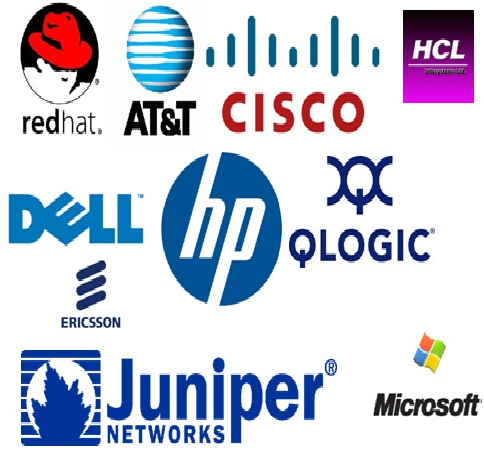 Featured Sector
Featured Sector

 Featured Sector
Featured Sector


Networking hardware typically refers to the equipment facilitating the use of a computer network which includes routers, switches, hubs, gateways, and access points, network interface cards, networking cables, network bridges, modems, ISDN adapters, firewalls and other equipments. Hardware prevalent within computer networking is the datacenter equipment (such as the database servers and the storage areas), network services (such as DNS, DHCP, email etc.) as well as other specific network devices such as content delivery.
The professionals associated with the discipline of computer hardware and developments of computer network are known as hardware and networking engineers. They also design and supervise the process of manufacturing and installation of hardware. Presence of Indian and foreign IT majors in the country has created a lot of scope for youth in this sector.
Hewlett-Packard, Nortel, Ericsson, Motorola, Cisco Systems, AT&T Technologies, Juniper Networks are the major players in the field of hardware and networking
RIM –Remote Infrastructure Management, which involves managing IT infrastructure such as servers, network devices, storage devices, IT security devices, etc. of an organization from a distance, is an emerging area. The Indian share in the Remote Infrastructure Management segment - which employs a large number of networking professionals, is expected to touch $13-15 billion by 2013. Approximately 3.5 Lakh jobs* are expected to be created in the RIM services’ sector. [*Source: NASSCOM-McKinsey Report]
While a hardware designer designs and creates a complete hardware package or portions of a hardware device, the hardware designing jobs often require good understanding of electronics, circuits, firmware, or design. Basics of operating systems, microprocessors, peripheral devices, computer architecture, assembly and disassembly, installing various software, configuring PCs, preventive maintenance and troubleshooting is a must. This can be followed by a relevant course or certification in networking to gain expertise in LAN and WAN, which is in high demand these days. Vendor certifications like Microsoft’s MCSE or Cisco’s CCNA or CCNP or CCIE, or Novel’s CNE or Sun Microsystems’ Sun Solaris Administrator at the higher end, are also increasingly sought by the recruiters.
The basic qualification for getting into networking is preferably a Degree / Diploma in Computer Sc / Electrical / Electronics / Telecommunication followed by a course in computer hardware.
Students with non-engineering background who possess good knowledge of computer fundamentals can also enter the field. In addition, recruiters prefer certain global certifications. Some of the popular International Certifications available for LAN/WAN Administration are MCSE, UNIX Admin, LINUX Admin, CNE, etc., whereas for WAN Administration you need CCNA, CCNP, CCDA, CCDP, and CCIE.
The basic profiles for computer networking and networking-related jobs are:
| 1.1 | Network Administrators are responsible for tasks such as customizing the network for their clients - designing the network as per the requirements of the corporation, installing the necessary software and security systems according to the daily needs and usage of the customers, reviewing the networks established by the network engineers as well as trouble-shooting them, resolving any network crash at the earliest moment with the guidance of the network engineers, data recovery from the crashed clients' network or from the server terminals, establishing an efficient support system for emergency contingencies at the network server, creating and managing user accounts and restricting access, based on the privileges allotted for different levels of users. Managing and controlling the network usage, its security with the addition of firewalls, updating the security measures periodically is also a part of the job. |
| 1.2 | Network Engineer are responsible for installing new software & hardware (servers, printers, computer workstations, etc.), setting up user accounts, permissions and passwords. Security of all systems, especially the internet, installing antivirus protection, fixing network faults, network maintenance, and technical support for people using the network. Day to day administration and monitoring of network use, planning future improvements, suggesting IT solutions to business problems is also a part of the job. |
| 1.3 | A Network (Service) Technician tends to focus more on the setup, troubleshooting, and repair of specific hardware and software products. Service Technicians in particular, often travel to remote customer sites to perform field upgrades and support. |
| 1.4 | A Network Programmer/Analyst has to deal with all core aspects of a computer network. They write software programs or script that aid in network analysis, diagnostics or monitoring utilities. The network equipment is usually created, configured, maintained and monitored by them. Additionally they also take responsibility of network security and design. They also specialize in evaluating third-party products and integrating new software technologies into an existing network environment or to build a new environment. |
| 1.5 | Network Security Administrator - They handle the entire network of computers within an organization; keep all the employees up to date with various security policies and certifications as needed. Additionally, they install and support all anti-virus and other relevant company software programs, implement and troubleshoot any security policies regarding internal computers, networks and the data that travels on them. Access of and modifications to any computer and sensitive information, keeping hackers out, reporting any suspicious activity on the network or any individual computer, monitoring the access and control points of sensitive data within the computers in order to keep an organization’s data safe are the most important job of a network security administrator. |